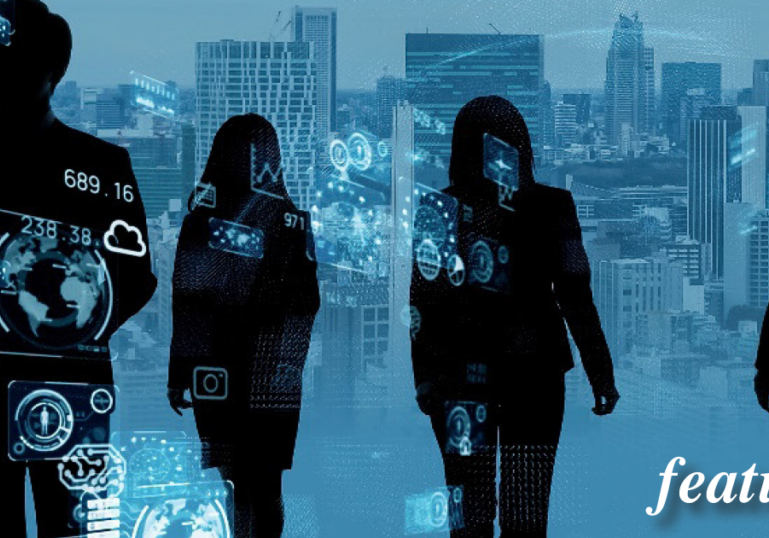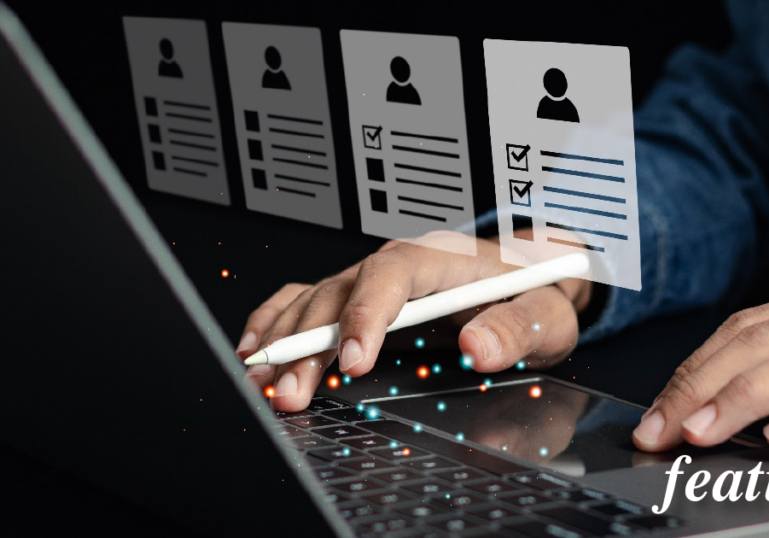Introduction
AI is shifting traditional HR functions—such as recruitment, onboarding[11], performance management, and employee development—toward automation and data-driven decision-making, allowing HR professionals to focus on strategic initiatives. Beyond automating repetitive tasks, Generative AI[8] creates new outputs, while agentic AI operates autonomously, strategically impacting workforce management and enabling skills-based decision-making. Additionally, AI enhances the manager-employee dynamic and elevates the candidate experience with personalized recommendations and streamlined application[9] processes. As AI capabilities expand, integrating advancements like natural language processing[1] and augmented reality[3], HR will continue to evolve toward greater efficiency and engagement. This AI-driven transformation will empower HR teams, business leaders, and employees alike, reshaping the future of work.
The HR Technology[10] Conference is the premier gathering of HR professionals. Hundreds of HR technology vendors and service partners come together annually in Las Vegas, NV, to showcase their offerings and introduce new product features. This year, the conference showcased the transformative power of artificial intelligence[2] (AI) in reshaping the HR landscape, with keynote speakers, industry experts, and technology innovators all offering valuable insights into how AI will revolutionize HR functions and support businesses, HR teams, managers, individual contributors, and candidates.
While I personally had some familiarity with AI’s potential in HR coming into the conference, I was stunned by the extent to which it has already been integrated into HR technology. Since last year’s conference introduced themes on AI in HR, I believe AI was still in its early stages of adoption by enterprise organizations. However, keynotes, breakout sessions, and the expo hall showed that AI is now a mainstream component of HR practices.
In this article, I will highlight AI’s transformative impact on HR, showcasing how AI-powered tools revolutionize talent management, automate tasks, and enhance decision-making.
AI-Driven HR: A New Paradigm
Integrating AI into HR technology and processes is ushering in a new era of talent management. AI-powered tools are revolutionizing traditional HR practices, from recruiting and onboarding to performance management and employee development. By automating repetitive tasks and providing data-driven insights, AI enables HR professionals to focus on strategic initiatives and foster a more engaged and productive workforce. AI is reshaping how organizations attract, develop, and retain top talent, from predictive analytics[4] identifying potential talent risks to personalized learning paths supporting employee growth.
Traditional AI in HR is still very present and focuses primarily on automating repetitive tasks and providing data-driven insights. It excels at:
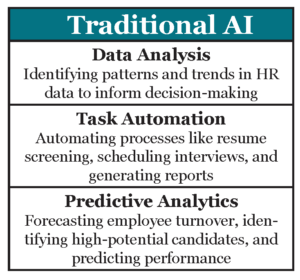
Unlike traditional AI, generative AI analyzes existing data[13] and generates new possibilities and outputs. For example, generative AI can be used for:

Agentic AI can operate autonomously, make decisions, take actions, and interact with the system with minimal human intervention. This type of AI can be adaptive and goal-driven, acting like an “agent” with a degree of autonomy. This shift has profound implications for HR. For instance, agentic AI-powered systems can:
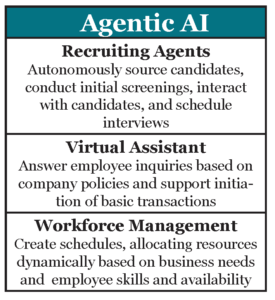
While traditional AI has been valuable in automating HR tasks, agentic AI has the potential to revolutionize the field by taking on more complex and strategic roles. As AI technology advances, we expect more agentic AI applications in HR, leading to more efficient, effective, and personalized talent management practices.
Skills-Based Business Decision-Making
Agentic AI also empowers organizations to adopt a skills-based approach to business decision-making. By focusing on the skills and capabilities of employees rather than their traditional roles or job titles, businesses can:
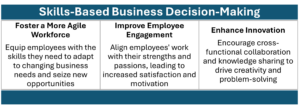
Supporting Businesses, HR Teams, Managers, and Employees
Agentic AI benefits businesses, HR teams, managers, and individual contributors. For example:
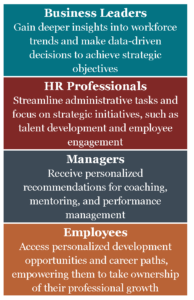
Supporting Business Leaders
AI offers business leaders valuable insights into workforce trends, enabling them to make data-driven decisions. By analyzing employee data, AI can identify skill gaps, predict attrition rates, and measure the impact of HR initiatives on business outcomes. These insights empower leaders to allocate resources effectively, foster a high-performance culture, and achieve strategic business goals.
Empowering HR Teams
HR professionals can leverage AI to enhance their efficiency and effectiveness. AI-powered tools can automate administrative tasks, allowing HR teams to focus on strategic initiatives and building strong employee relationships. Additionally, AI can provide HR professionals with data-driven insights to support talent acquisition, development, and retention strategies.
Transforming the Manager-Employee Relationship
AI has the potential to redefine the manager-employee relationship by providing managers with tools to support their teams more effectively. AI-powered performance management systems can offer personalized feedback and development recommendations, while AI-driven analytics[12] can help managers identify and address potential issues early on. These analytical tools can improve employee engagement[5], productivity, and overall job satisfaction.
Enhancing the Candidate Experience
AI can significantly enhance the candidate experience by automating the application process[14] and providing personalized communication. AI-powered chatbots can answer candidate questions and guide them through the application process. At the same time, AI-driven talent acquisition platforms can match candidates with suitable job opportunities based on their skills and experience. These enhanced capabilities can improve the overall candidate experience and attract top talent to the organization.
Conclusion: The Future of HR Technology
HR technology is expected to become even more sophisticated and integrated as AI evolves. Keynote speakers at the HR Technology Conference 2024 discussed emerging trends such as natural language processing, machine learning[6], and augmented reality, which can potentially transform HR practices further. These technologies can enable personalized experiences, improve decision-making, and create a more engaging and productive workplace.
AI is poised to play a pivotal role in reshaping the HR landscape. By automating tasks, enhancing decision-making, and improving employee experiences, AI can help businesses achieve their strategic goals, create a positive work environment, and attract and retain top talent. As HR professionals continue to embrace AI-powered solutions, they can position their organizations for success in the digital age.
The branch of AI that focuses on the interaction between computers and human language, enabling tasks such as language understanding and generation.
The simulation of human intelligence processes by machines, especially computer systems. These processes include learning (the acquisition of information and rules for using the information), reasoning (using rules to reach approximate or definite conclusions) and self-correction. The simulation of human intelligence in machines that enables them to perform tasks such as learning, reasoning, and problem-solving.
Technology that overlays virtual objects or information onto the real-world environment, enhancing the user’s perception and interaction with their surroundings.
A range of analytical and statistical techniques used for developing models that may be used to predict future events or behaviors.
Employee engagement, also called worker engagement, is a business management concept. An “engaged employee” is one who is fully involved in, and enthusiastic about their work, and thus will act in a way that furthers their organization’s interests.


